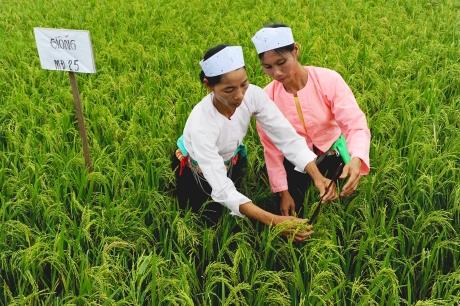Farmer taking the lead
As 30 years of FFS success shows, there are clear global benefits to empowering producers at the local level.

In Viet Nam and Kenya, FFS are enabling farmers to improve their food security by testing and adopting new agricultural techniques. ©FAO/Hoang Dinh Nam
Since 1989, farmer field schools (FFS) have been empowering farmers to drive sustainable development at the local level. Originally conceived as a way to help Indonesian smallholders apply integrated pest management approaches in rice production, FFS have since found success in a wide variety of contexts around the world. Since 1989, an estimated 20 million smallholders have participated in FFS, which are now implemented in over 90 countries.
So, what exactly are farmer field schools?
At the core of farmer field schools is hands-on group learning. Supported by a trained facilitator, each FFS group gathers 20-30 smallholders and meets regularly over the course of an entire production cycle – from seed to seed, egg to egg, or calf to calf. Building on farmers’ skills and knowledge, FFS participants test new ideas and enhance their capacity to critically analyse and solve local agricultural challenges.
Farmer field schools now cover a wide range of topics, including crops, aquaculture, animal husbandry, forestry, land and water management and social issues. Within these topics, entry points range from climate change adaptation and women’s empowerment to value chains. Because the learning process is so dynamic, farmer field schools can respond to local needs and opportunities, turning farmers into local organizers who can support their communities’ natural, human, social and financial capital.
In Viet Nam, for example, the FFS approach has revitalized rice-fish systems. Farmers used to raise fish in their flooded rice fields – fish would provide another food and income source for farmers. However, overuse of pesticides killed fish, disrupting this symbiotic relationship. By phasing out pesticides and reintroducing fish production in rice fields, the FFS programme enabled farmers to increase their income, improve their nutrition and sustainably manage their landscape.
